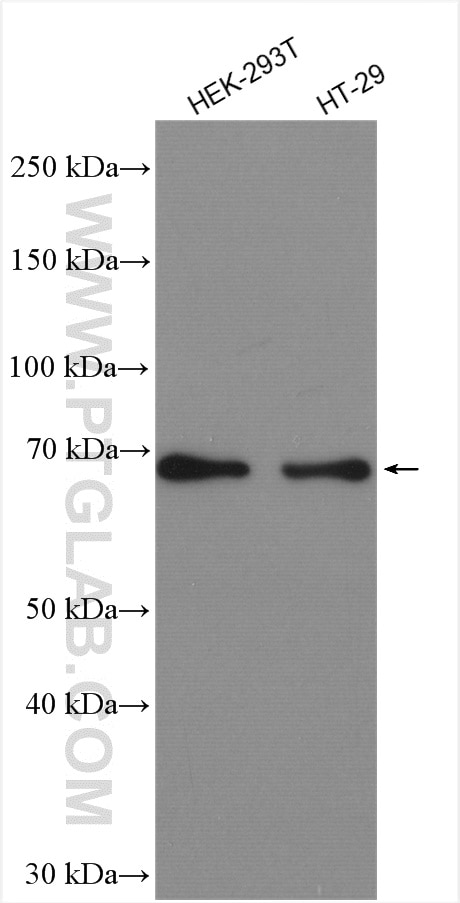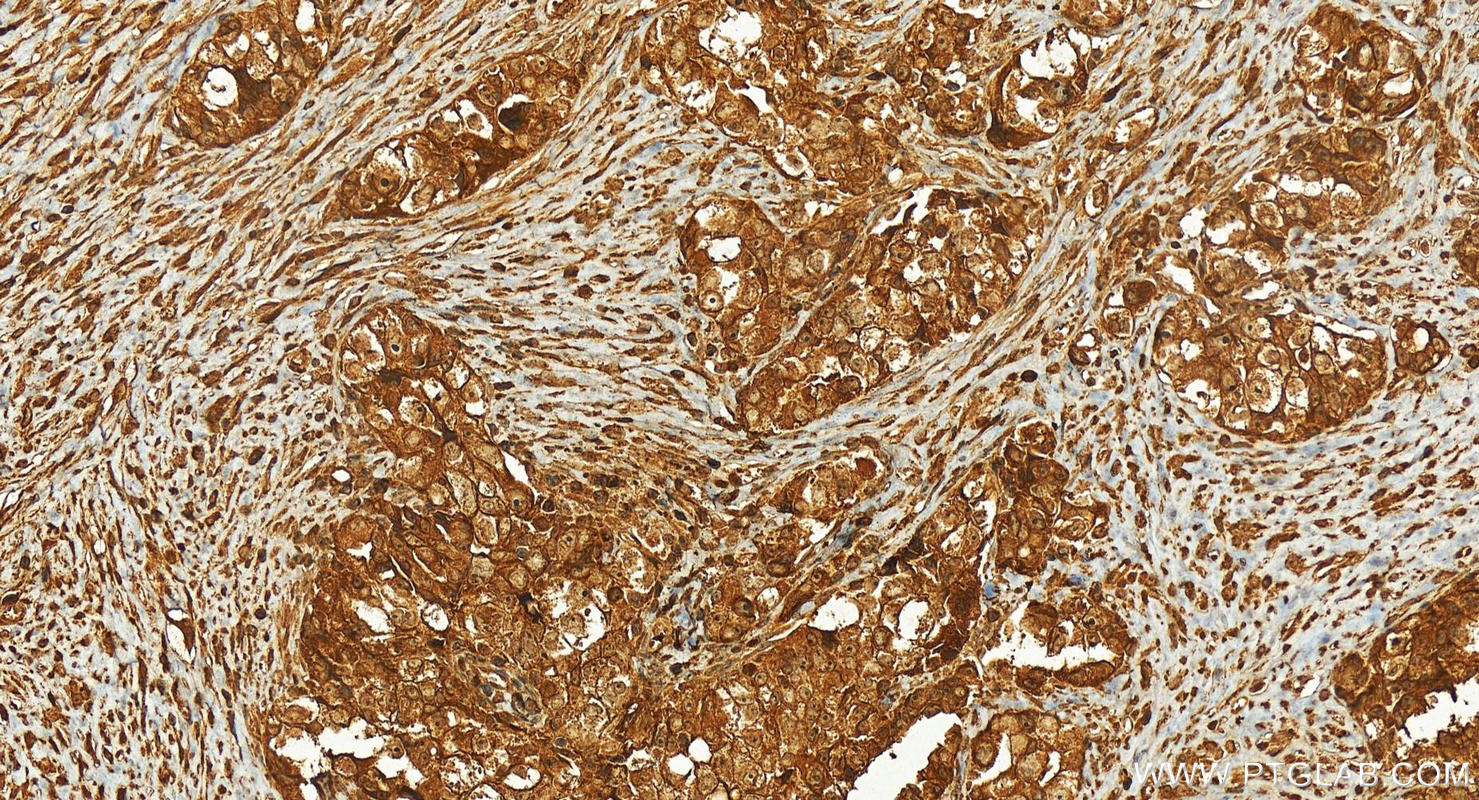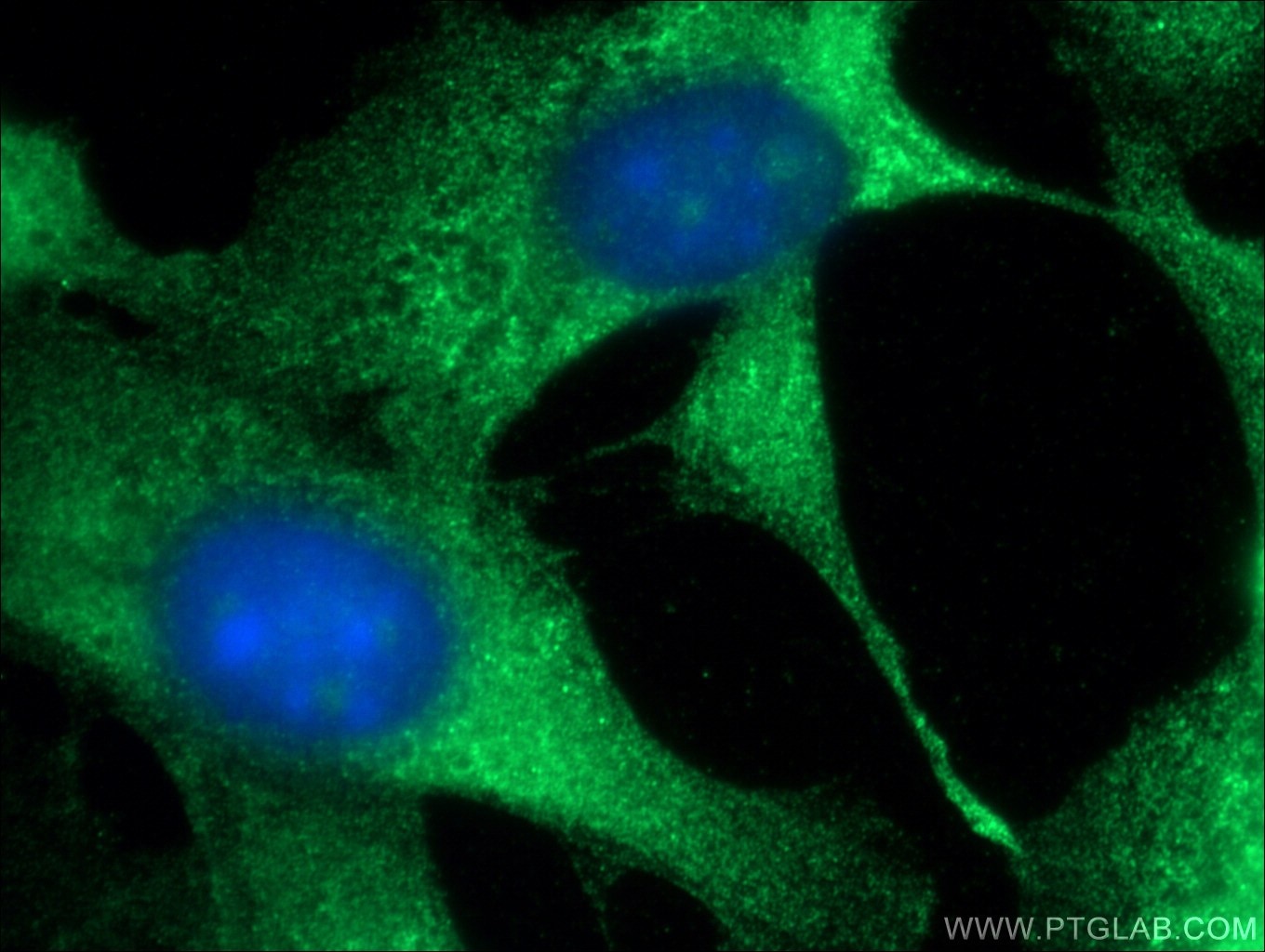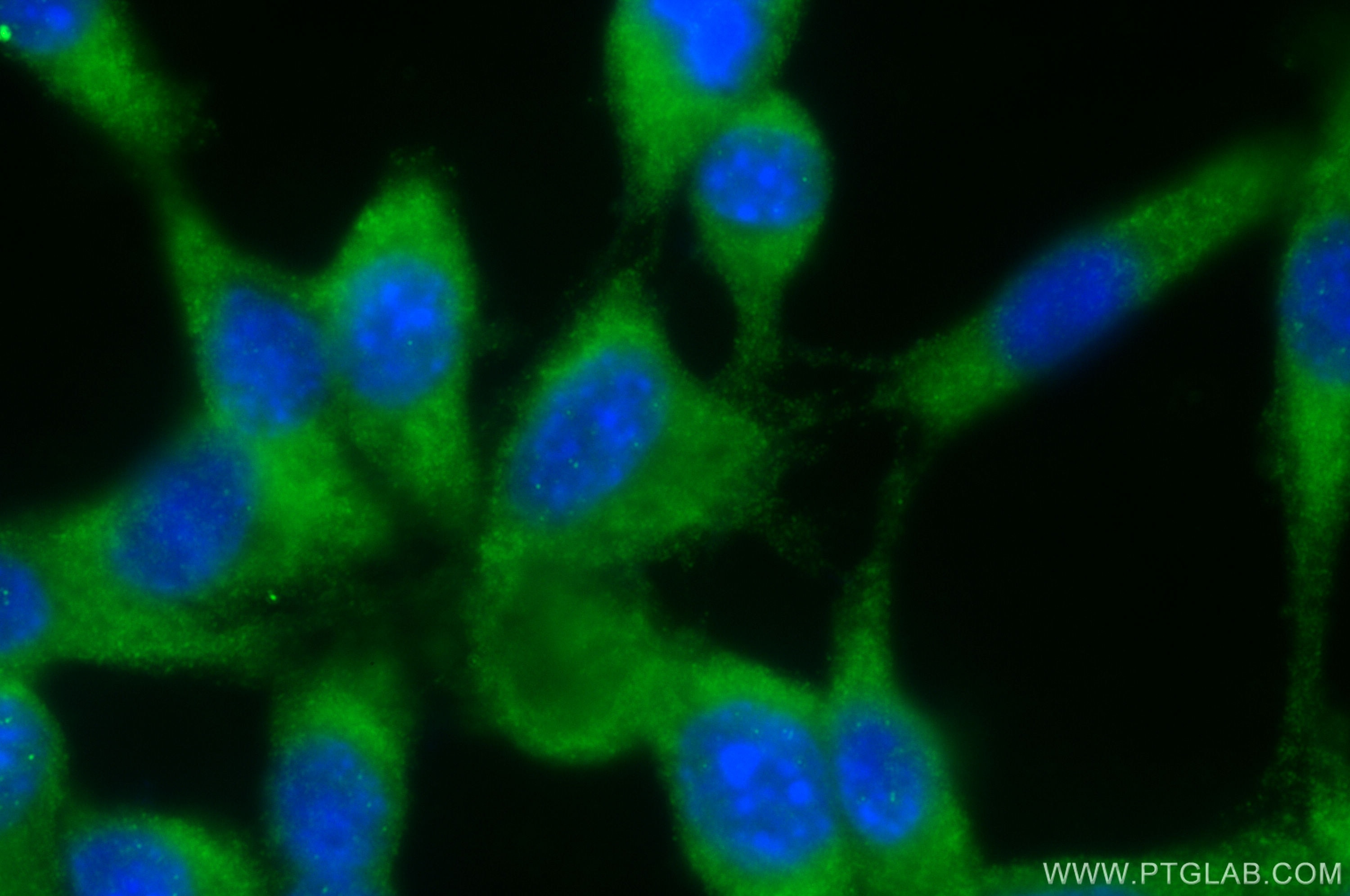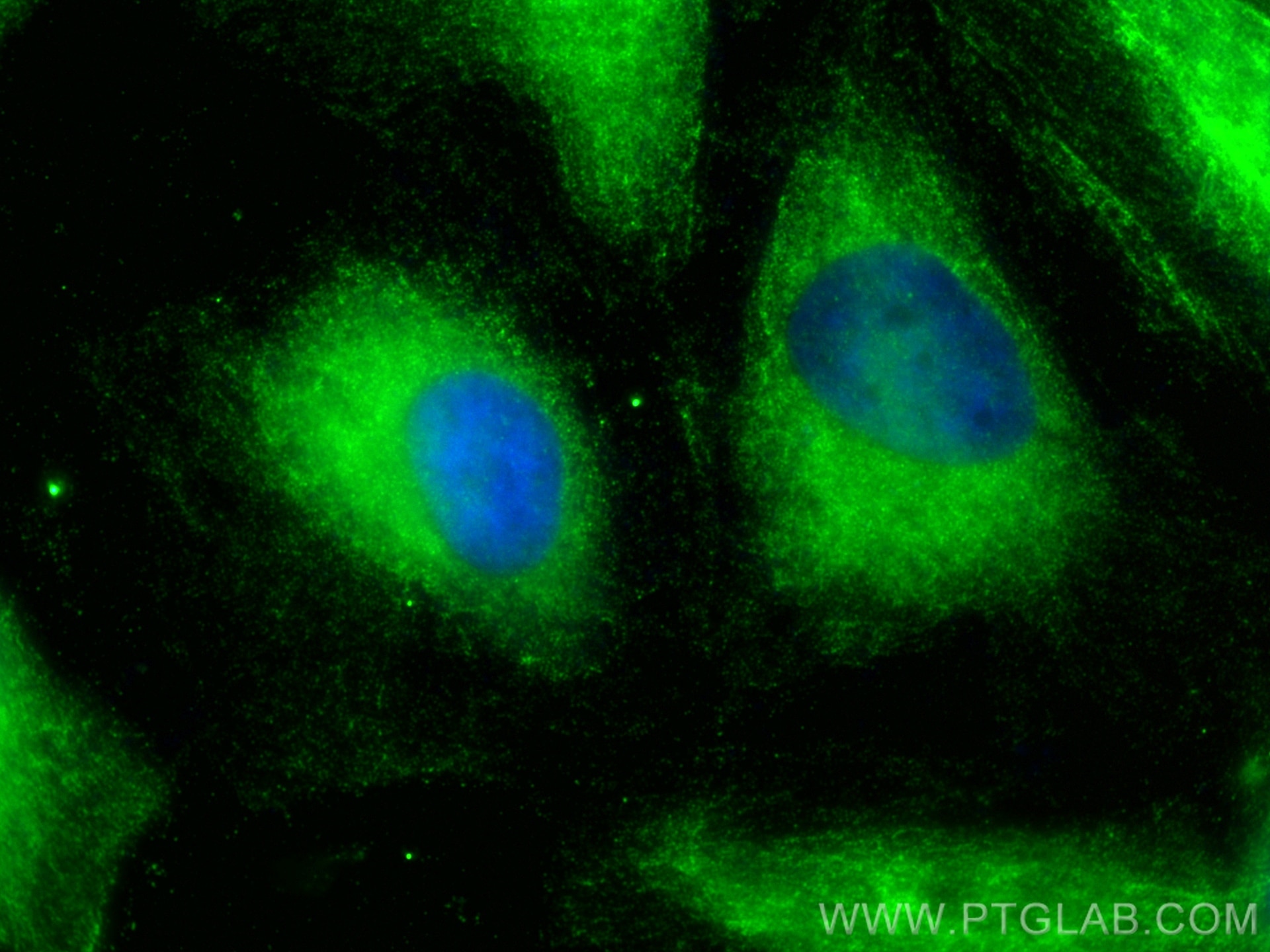Anticorps Polyclonal de lapin anti-PKC Zeta
PKC Zeta Polyclonal Antibody for WB, IHC, IF/ICC, ELISA
Hôte / Isotype
Lapin / IgG
Réactivité testée
Humain, souris
Applications
WB, IHC, IF/ICC, ELISA
Conjugaison
Non conjugué
N° de cat : 26899-1-AP
Synonymes
Galerie de données de validation
Applications testées
| Résultats positifs en WB | cellules HEK-293T, cellules HT-29 |
| Résultats positifs en IHC | human ovary cancer tissue, il est suggéré de démasquer l'antigène avec un tampon de TE buffer pH 9.0; (*) À défaut, 'le démasquage de l'antigène peut être 'effectué avec un tampon citrate pH 6,0. |
| Résultats positifs en IF/ICC | cellules HeLa, cellules NIH/3T3 |
Dilution recommandée
| Application | Dilution |
|---|---|
| Western Blot (WB) | WB : 1:1000-1:4000 |
| Immunohistochimie (IHC) | IHC : 1:50-1:500 |
| Immunofluorescence (IF)/ICC | IF/ICC : 1:200-1:800 |
| It is recommended that this reagent should be titrated in each testing system to obtain optimal results. | |
| Sample-dependent, check data in validation data gallery | |
Applications publiées
| KD/KO | See 1 publications below |
| WB | See 5 publications below |
| IF | See 2 publications below |
Informations sur le produit
26899-1-AP cible PKC Zeta dans les applications de WB, IHC, IF/ICC, ELISA et montre une réactivité avec des échantillons Humain, souris
| Réactivité | Humain, souris |
| Réactivité citée | Humain, souris |
| Hôte / Isotype | Lapin / IgG |
| Clonalité | Polyclonal |
| Type | Anticorps |
| Immunogène | PKC Zeta Protéine recombinante Ag25391 |
| Nom complet | protein kinase C, zeta |
| Masse moléculaire calculée | 80 kDa |
| Poids moléculaire observé | 67 kDa |
| Numéro d’acquisition GenBank | BC014270 |
| Symbole du gène | PKC Zeta |
| Identification du gène (NCBI) | 5590 |
| Conjugaison | Non conjugué |
| Forme | Liquide |
| Méthode de purification | Purification par affinité contre l'antigène |
| Tampon de stockage | PBS with 0.02% sodium azide and 50% glycerol |
| Conditions de stockage | Stocker à -20°C. Stable pendant un an après l'expédition. L'aliquotage n'est pas nécessaire pour le stockage à -20oC Les 20ul contiennent 0,1% de BSA. |
Informations générales
Protein kinase C (PKC) zeta is a member of the PKC family of serine/threonine kinases which are involved in a variety of cellular processes such as proliferation, differentiation and secretion. Unlike the classical PKC isoenzymes which are calcium-dependent, PKC zeta exhibits a kinase activity which is independent of calcium and diacylglycerol but not of phosphatidylserine. Furthermore, it is insensitive to typical PKC inhibitors and cannot be activated by phorbol ester. Unlike the classical PKC isoenzymes, it has only a single zinc finger module. These structural and biochemical properties indicate that the zeta subspecies is related to, but distinct from other isoenzymes of PKC.
Protocole
| Product Specific Protocols | |
|---|---|
| WB protocol for PKC Zeta antibody 26899-1-AP | Download protocol |
| IHC protocol for PKC Zeta antibody 26899-1-AP | Download protocol |
| IF protocol for PKC Zeta antibody 26899-1-AP | Download protocol |
| Standard Protocols | |
|---|---|
| Click here to view our Standard Protocols |
Publications
| Species | Application | Title |
|---|---|---|
PLoS Pathog HRS plays an important role for TLR7 signaling to orchestrate inflammation and innate immunity upon EV71 infection. | ||
JCI Insight Targeting ATGL to rescue BSCL2 lipodystrophy and its associated cardiomyopathy. | ||
Fish Shellfish Immunol In vivo study of a novel protein kinase C that mediates immunocompetence and catecholamine biosynthesis in hemocytes of Litopenaeus vannamei by using its potential competitive inhibitor, bisindolylmaleimide I. | ||
J Cell Mol Med Photobiomodulation therapy promotes the ATP-binding cassette transporter A1-dependent cholesterol efflux in macrophage to ameliorate atherosclerosis. | ||
Cell Rep Med Arachidonic acid released by PIK3CA mutant tumor cells triggers malignant transformation of colonic epithelium by inducing chromatin remodeling
| ||
Dev Cell Epithelial aPKC deficiency leads to stem cell loss preceding metaplasia in colorectal cancer initiation |
